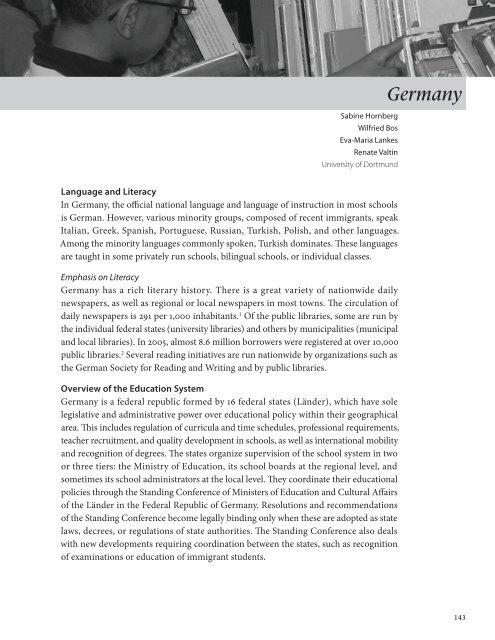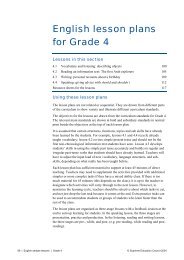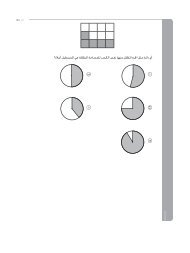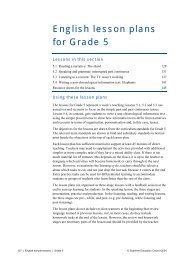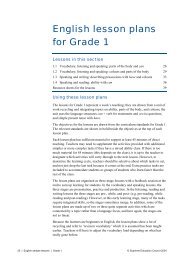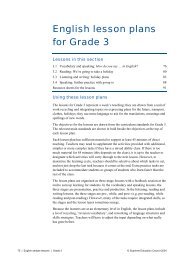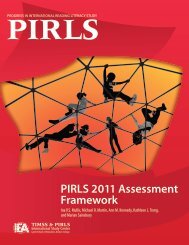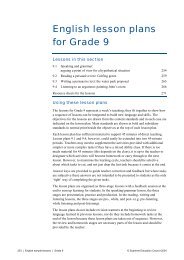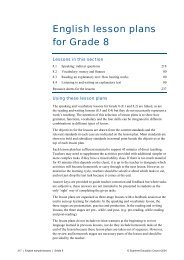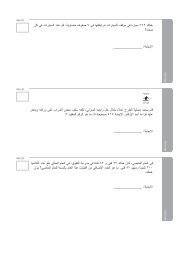- Page 1:
PIRLSPROGRESS IN INTERNATIONAL READ
- Page 6 and 7:
PIRLS 2006 Encyclopedia
- Page 8:
PIRLS 2006 EncyclopediaThe PIRLS 20
- Page 12 and 13:
PIRLS 2006 EncyclopediaFigure 1 Cou
- Page 14 and 15:
PIRLS 2006 Encyclopedia14 new count
- Page 17 and 18:
IntroductionTable 1CountriesSelecte
- Page 19 and 20:
Countries Language(s) of Instructio
- Page 21 and 22:
Table 5 contains reports about the
- Page 23 and 24:
Teacher Education and Certification
- Page 25 and 26:
IntroductionTable 7 Primary Grade T
- Page 27 and 28:
Federal Ministry for Education, Art
- Page 29 and 30:
PIRLS 2006 Encyclopedia• Berufsbi
- Page 31 and 32:
Reading Instruction in the Primary
- Page 33:
lernen können), is accessible to a
- Page 36 and 37:
PIRLS 2006 Encyclopedia• Analyze
- Page 38 and 39:
PIRLS 2006 EncyclopediaSuggested Li
- Page 40 and 41:
PIRLS 2006 Encyclopediathrough univ
- Page 42 and 43:
PIRLS 2006 Encyclopediato learn and
- Page 44 and 45:
PIRLS 2006 EncyclopediaUse of Techn
- Page 46 and 47:
PIRLS 2006 Encyclopediaand guidance
- Page 48 and 49:
PIRLS 2006 EncyclopediaReferences1
- Page 50 and 51:
PIRLS 2006 EncyclopediaIn 1997, an
- Page 52 and 53:
PIRLS 2006 Encyclopediamore precise
- Page 54 and 55:
PIRLS 2006 Encyclopedial’école),
- Page 56 and 57:
PIRLS 2006 EncyclopediaClassroom ma
- Page 58 and 59:
PIRLS 2006 EncyclopediaBelgium, Fre
- Page 60 and 61:
PIRLS 2006 Encyclopedia• Define u
- Page 62 and 63:
PIRLS 2006 Encyclopediainstruction
- Page 64 and 65:
PIRLS 2006 Encyclopediaby pedagogic
- Page 66 and 67:
PIRLS 2006 EncyclopediaReferences1
- Page 68 and 69:
PIRLS 2006 Encyclopediaprovide an i
- Page 70 and 71:
PIRLS 2006 EncyclopediaReading Disa
- Page 72 and 73:
PIRLS 2006 EncyclopediaTeachers com
- Page 74 and 75:
PIRLS 2006 EncyclopediaSecond-langu
- Page 76 and 77:
PIRLS 2006 Encyclopediabiology, che
- Page 78 and 79:
PIRLS 2006 EncyclopediaReading Curr
- Page 80 and 81:
PIRLS 2006 EncyclopediaDiagnostic T
- Page 82 and 83:
PIRLS 2006 EncyclopediaEmphasis on
- Page 84 and 85:
PIRLS 2006 Encyclopediafor English-
- Page 86 and 87:
PIRLS 2006 Encyclopediafor boards a
- Page 88 and 89:
PIRLS 2006 Encyclopediaimprove thei
- Page 90 and 91:
PIRLS 2006 EncyclopediaSummary of t
- Page 92 and 93:
PIRLS 2006 EncyclopediaSuggested Re
- Page 94 and 95:
PIRLS 2006 EncyclopediaCanadaRefere
- Page 96 and 97:
PIRLS 2006 EncyclopediaStructure of
- Page 98 and 99: PIRLS 2006 Encyclopedia• Understa
- Page 100 and 101: PIRLS 2006 Encyclopedia• Sentence
- Page 102 and 103: PIRLS 2006 Encyclopediaprofessors,
- Page 104 and 105: PIRLS 2006 Encyclopedia
- Page 106 and 107: PIRLS 2006 EncyclopediaOverview of
- Page 108 and 109: PIRLS 2006 Encyclopediaplans are de
- Page 110 and 111: PIRLS 2006 Encyclopediafor third gr
- Page 112 and 113: PIRLS 2006 Encyclopedialanguage and
- Page 114 and 115: PIRLS 2006 EncyclopediaSuggested Re
- Page 116 and 117: PIRLS 2006 Encyclopedia
- Page 118 and 119: PIRLS 2006 Encyclopediaprimary educ
- Page 120 and 121: PIRLS 2006 EncyclopediaEngland• D
- Page 122 and 123: PIRLS 2006 EncyclopediaUse of Techn
- Page 124 and 125: PIRLS 2006 EncyclopediaSpecial Educ
- Page 126 and 127: PIRLS 2006 EncyclopediaStandardized
- Page 128 and 129: PIRLS 2006 EncyclopediaReferences (
- Page 130 and 131: PIRLS 2006 Encyclopediailliteracy.
- Page 132 and 133: PIRLS 2006 Encyclopediadiscover the
- Page 134 and 135: PIRLS 2006 Encyclopedia• Debate t
- Page 136 and 137: PIRLS 2006 EncyclopediaThese school
- Page 138 and 139: PIRLS 2006 EncyclopediaMonitoring I
- Page 140 and 141: PIRLS 2006 Encyclopedia
- Page 142 and 143: PIRLS 2006 Encyclopediaof the insti
- Page 144 and 145: PIRLS 2006 Encyclopedia• Develop
- Page 146 and 147: PIRLS 2006 Encyclopediafor teachers
- Page 150 and 151: PIRLS 2006 EncyclopediaThe Federal
- Page 152 and 153: PIRLS 2006 EncyclopediaAll federal
- Page 154 and 155: PIRLS 2006 EncyclopediaRole of Read
- Page 156 and 157: PIRLS 2006 Encyclopediais provided
- Page 158 and 159: PIRLS 2006 EncyclopediaSuggested Re
- Page 160 and 161: PIRLS 2006 Encyclopedia
- Page 162 and 163: PIRLS 2006 Encyclopediaprograms, bu
- Page 164 and 165: PIRLS 2006 Encyclopediacritically i
- Page 166 and 167: PIRLS 2006 EncyclopediaInstructiona
- Page 168 and 169: PIRLS 2006 Encyclopediahampering ch
- Page 170 and 171: PIRLS 2006 Encyclopediahumanities,
- Page 172 and 173: PIRLS 2006 Encyclopedia
- Page 174 and 175: PIRLS 2006 EncyclopediaReligious in
- Page 176 and 177: PIRLS 2006 Encyclopediaintroductory
- Page 178 and 179: PIRLS 2006 Encyclopediatheir readin
- Page 180 and 181: PIRLS 2006 EncyclopediaAfter comple
- Page 182 and 183: PIRLS 2006 EncyclopediaReferences1
- Page 184 and 185: PIRLS 2006 Encyclopediacollection a
- Page 186 and 187: PIRLS 2006 EncyclopediaSummary of N
- Page 188 and 189: PIRLS 2006 EncyclopediaTable 1Appro
- Page 190 and 191: PIRLS 2006 EncyclopediaTeacher In-s
- Page 192 and 193: PIRLS 2006 Encyclopedia
- Page 194 and 195: PIRLS 2006 EncyclopediaFinally, in
- Page 196 and 197: PIRLS 2006 EncyclopediaAfter that,
- Page 198 and 199:
PIRLS 2006 Encyclopedia
- Page 200 and 201:
PIRLS 2006 Encyclopedia• Publishi
- Page 202 and 203:
PIRLS 2006 Encyclopedia• Strength
- Page 204 and 205:
PIRLS 2006 EncyclopediaTeachers als
- Page 206 and 207:
PIRLS 2006 EncyclopediaReferences1
- Page 208 and 209:
PIRLS 2006 EncyclopediaStructure of
- Page 210 and 211:
PIRLS 2006 Encyclopediathe Ministry
- Page 212 and 213:
PIRLS 2006 EncyclopediaInstructiona
- Page 214 and 215:
PIRLS 2006 EncyclopediaSince 2003,
- Page 216 and 217:
PIRLS 2006 EncyclopediaThe matricul
- Page 218 and 219:
PIRLS 2006 EncyclopediaSince 1995,
- Page 220 and 221:
PIRLS 2006 Encyclopedia16 concrete
- Page 222 and 223:
PIRLS 2006 Encyclopediagrammatical
- Page 224 and 225:
PIRLS 2006 Encyclopediaintegration.
- Page 226 and 227:
PIRLS 2006 EncyclopediaStandardized
- Page 228 and 229:
PIRLS 2006 EncyclopediaReferences1
- Page 230 and 231:
PIRLS 2006 Encyclopediathe same fin
- Page 232 and 233:
PIRLS 2006 Encyclopediaread words a
- Page 234 and 235:
PIRLS 2006 EncyclopediaStandardized
- Page 236 and 237:
PIRLS 2006 Encyclopedialicenses for
- Page 238 and 239:
PIRLS 2006 Encyclopedia• Comprehe
- Page 240 and 241:
PIRLS 2006 Encyclopediais allowed i
- Page 242 and 243:
PIRLS 2006 EncyclopediaReferences (
- Page 244 and 245:
PIRLS 2006 Encyclopediaat the prima
- Page 246 and 247:
PIRLS 2006 EncyclopediaReading Inst
- Page 248 and 249:
PIRLS 2006 EncyclopediaStudents who
- Page 250 and 251:
PIRLS 2006 Encyclopedia
- Page 252 and 253:
PIRLS 2006 EncyclopediaBudget and s
- Page 254 and 255:
PIRLS 2006 EncyclopediaIn Luxembour
- Page 256 and 257:
PIRLS 2006 Encyclopediamaterials ar
- Page 258 and 259:
PIRLS 2006 Encyclopediathe number o
- Page 260 and 261:
PIRLS 2006 EncyclopediaMonitoring I
- Page 262 and 263:
PIRLS 2006 Encyclopedia
- Page 264 and 265:
PIRLS 2006 Encyclopediaof schools.
- Page 266 and 267:
PIRLS 2006 Encyclopediaa program in
- Page 268 and 269:
PIRLS 2006 EncyclopediaMonitoring I
- Page 270 and 271:
PIRLS 2006 EncyclopediaStructure of
- Page 272 and 273:
PIRLS 2006 Encyclopedia• Know the
- Page 274 and 275:
PIRLS 2006 EncyclopediaExaminations
- Page 276 and 277:
PIRLS 2006 Encyclopedia
- Page 278 and 279:
PIRLS 2006 EncyclopediaThe Dutch ed
- Page 280 and 281:
PIRLS 2006 Encyclopediacontent of t
- Page 282 and 283:
PIRLS 2006 EncyclopediaThe Ministry
- Page 284 and 285:
PIRLS 2006 Encyclopediaand equipmen
- Page 286 and 287:
PIRLS 2006 EncyclopediaThe Netherla
- Page 288 and 289:
PIRLS 2006 EncyclopediaThe main foc
- Page 290 and 291:
PIRLS 2006 EncyclopediaPrivate or i
- Page 292 and 293:
PIRLS 2006 Encyclopediaincluding th
- Page 294 and 295:
PIRLS 2006 Encyclopedia• Teachers
- Page 296 and 297:
PIRLS 2006 Encyclopediaor Year 1 an
- Page 298 and 299:
PIRLS 2006 EncyclopediaThe New Zeal
- Page 300 and 301:
PIRLS 2006 EncyclopediaReferences (
- Page 302 and 303:
PIRLS 2006 EncyclopediaIn January 2
- Page 304 and 305:
PIRLS 2006 EncyclopediaAt the end o
- Page 306 and 307:
PIRLS 2006 EncyclopediaInstruction
- Page 308 and 309:
PIRLS 2006 EncyclopediaSuggested Re
- Page 310 and 311:
PIRLS 2006 Encyclopediainto subject
- Page 312 and 313:
PIRLS 2006 EncyclopediaInstructiona
- Page 314 and 315:
PIRLS 2006 EncyclopediaSuggested Re
- Page 316 and 317:
PIRLS 2006 EncyclopediaUntil 2002,
- Page 318 and 319:
PIRLS 2006 EncyclopediaSummary of t
- Page 320 and 321:
PIRLS 2006 EncyclopediaRole of Read
- Page 322 and 323:
PIRLS 2006 Encyclopediaand the Scho
- Page 324 and 325:
PIRLS 2006 EncyclopediaSuggested Re
- Page 326 and 327:
PIRLS 2006 EncyclopediaStructure of
- Page 328 and 329:
PIRLS 2006 Encyclopediato demonstra
- Page 330 and 331:
PIRLS 2006 EncyclopediaReading Inst
- Page 332 and 333:
PIRLS 2006 Encyclopedia• The use
- Page 334 and 335:
PIRLS 2006 Encyclopediastandardized
- Page 336 and 337:
PIRLS 2006 EncyclopediaFederal educ
- Page 338 and 339:
PIRLS 2006 Encyclopediaattending su
- Page 340 and 341:
PIRLS 2006 EncyclopediaReading Curr
- Page 342 and 343:
PIRLS 2006 Encyclopediaof different
- Page 344 and 345:
PIRLS 2006 EncyclopediaThe teacher
- Page 346 and 347:
PIRLS 2006 EncyclopediaSuggested Re
- Page 348 and 349:
PIRLS 2006 Encyclopediapolicy, comm
- Page 350 and 351:
PIRLS 2006 EncyclopediaThese skills
- Page 352 and 353:
PIRLS 2006 Encyclopediaand life of
- Page 354 and 355:
PIRLS 2006 EncyclopediaSpecial Educ
- Page 356 and 357:
PIRLS 2006 EncyclopediaAifL is desi
- Page 358 and 359:
PIRLS 2006 EncyclopediaReferences (
- Page 360 and 361:
PIRLS 2006 Encyclopediaregistration
- Page 362 and 363:
PIRLS 2006 EncyclopediaSingaporeSch
- Page 364 and 365:
PIRLS 2006 Encyclopediaprimary and
- Page 366 and 367:
PIRLS 2006 EncyclopediaReading spec
- Page 368 and 369:
PIRLS 2006 Encyclopediaoffers speci
- Page 370 and 371:
PIRLS 2006 EncyclopediaSuggested Re
- Page 372 and 373:
PIRLS 2006 EncyclopediaLibraries pl
- Page 374 and 375:
PIRLS 2006 EncyclopediaThe Slovak R
- Page 376 and 377:
PIRLS 2006 EncyclopediaAt the end o
- Page 378 and 379:
PIRLS 2006 EncyclopediaIn the first
- Page 380 and 381:
PIRLS 2006 Encyclopediathe same dat
- Page 382 and 383:
PIRLS 2006 EncyclopediaOverview of
- Page 384 and 385:
PIRLS 2006 EncyclopediaSummary of N
- Page 386 and 387:
PIRLS 2006 Encyclopediaschool are r
- Page 388 and 389:
PIRLS 2006 EncyclopediaInstead, tea
- Page 390 and 391:
PIRLS 2006 EncyclopediaIf drafted i
- Page 392 and 393:
PIRLS 2006 EncyclopediaThe South Af
- Page 394 and 395:
PIRLS 2006 Encyclopediawrite, perso
- Page 396 and 397:
PIRLS 2006 EncyclopediaSchools with
- Page 398 and 399:
PIRLS 2006 EncyclopediaStandardized
- Page 400 and 401:
PIRLS 2006 Encyclopedia
- Page 402 and 403:
PIRLS 2006 EncyclopediaIn addition,
- Page 404 and 405:
PIRLS 2006 Encyclopediato reading i
- Page 406 and 407:
PIRLS 2006 Encyclopediastudy is Eng
- Page 408 and 409:
PIRLS 2006 EncyclopediaAt the end o
- Page 410 and 411:
PIRLS 2006 Encyclopedia
- Page 412 and 413:
PIRLS 2006 Encyclopediafunded, orga
- Page 414 and 415:
PIRLS 2006 EncyclopediaStudents sho
- Page 416 and 417:
PIRLS 2006 Encyclopediachildren’s
- Page 418 and 419:
PIRLS 2006 Encyclopediaother instit
- Page 420 and 421:
PIRLS 2006 Encyclopedia
- Page 422 and 423:
PIRLS 2006 EncyclopediaLibraries ha
- Page 424 and 425:
PIRLS 2006 Encyclopediaand the Yout
- Page 426 and 427:
PIRLS 2006 EncyclopediaInstructiona
- Page 428 and 429:
PIRLS 2006 Encyclopediaare used for
- Page 430 and 431:
PIRLS 2006 EncyclopediaUnited State
- Page 432 and 433:
PIRLS 2006 Encyclopediaof children
- Page 434 and 435:
PIRLS 2006 EncyclopediaState standa
- Page 436 and 437:
PIRLS 2006 Encyclopediatimes higher
- Page 438 and 439:
PIRLS 2006 Encyclopediaand holds a
- Page 440 and 441:
PIRLS 2006 EncyclopediaUnited State
- Page 442 and 443:
PIRLS 2006 Encyclopedia
- Page 444 and 445:
HungaryIldiko BalazsiPéter Balkán
- Page 446:
TIMSS & PIRLSInternational Study Ce


